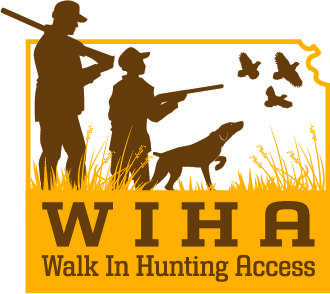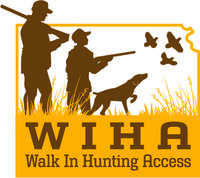Walk-in Hunting Access Program
The walk-in hunting access (WIHA) program kicked off in 1995 in an effort to enhance the strong Kansas hunting heritage by providing hunting access to private property. The program has grown to one of the most successful access programs in the country. By 2004, over 1 million acres were enrolled in the program providing countless opportunities for sportsmen to pursue their favorite game at no additional charge. Although the majority of the acreage provides good to excellent upland game bird hunting, some areas provide opportunities for deer, waterfowl and squirrel hunting as well. Landowners receive a modest payment in exchange for allowing public hunting access. Payments vary by the amount of acres enrolled and length of contract period. Contract dates can be established from September 1 or November 1 through January 31 of each year. In addition, other lands are leased for spring turkey hunting only (April 1- May 31). Land enrolled can be in CRP, native rangeland, wheat or milo stubble and riparian or wetland areas. The area is posted with signs designating it as WIHA, regularly patrolled, and safety zones clearly marked. Liability is waived from private individuals who lease land to the state for recreational purposes. State law provides immunity from damages or injuries resulting from ordinary negligence. For more information fill out the application in the brochure below and send it to the Regional Office in your area or contact Private Lands Coordinator in Pratt Operations Office for more information.
Access Donation Program
This is an opportunity for hunters and anglers to assist with leasing more land for public access by making a voluntary donation to the WIHA and F.I.S.H. Programs. Currently, demand by landowners or tenants to enroll their property in the WIHA program exceeds the amount of funds available to accept the property. Surveys indicate that hunters and anglers would pay a fee to be able to hunt or fish on these properties, however, KDWP's goal is to keep the programs at no addtional charge to the sportsmen. Additionaly, some users of these access programs have expressed the desire to be able to contribute voluntary donations. Now anyone can make a contribution that will go into leasing more private land for hunting and fishing. Contributions in any amount can be made at any time. For a contributions of $25 or more, you can receive a limited edition hat recognizing your support to the programs or a one-year subscription to Kansas Wildlife & Parks magazine.
Send check or money order payable to:
KDWP Access Wildtrust Account, Kansas Department of Wildlife and Parks, 512 SE 25th Ave., Pratt, KS 67124. Include your name, address and for contributions of $25 or more indicate whether you would like a hat or magazine subscription.
WIHA logo

The Walk-In Hunting Area (WIHA) program is an expansion of a pilot project started in 1995. The Department of Wildlife and Parks leases private land and opens it to public hunting. A survey of both landowners and users of the WIHA tracts the first year found great acceptance by both groups. Much of the success of the program the first year was due to the responsible behavior of hunters.
The WIHA program promises every hunter who purchases a Kansas hunting license the opportunity to enjoy the state's diverse wildlife resources. Common sense and ethical behavior will ensure that the program may be expanded for all to enjoy in the future.
The following guidelines will assist sportsmen in using WIHA tracts:
- Obey the safety zone concept. Allow a buffer around livestock and buildings. Be sure of your target, as other hunters may be using the area and will likely be in camouflage.
- If the WIHA property is bordered by a hedgerow or creek, hunt only on the side which is on the WIHA tract. Do not walk, hunt, or park on adjacent property. Hunting on the wrong side of the WIHA property boundary is a trespass violation and jeopardizes the future of the program.
- Do not damage standing crops.
- Obey all Kansas hunting rules and regulations and respect the rights of the landowners and others using the area. Treat the land as if it were your own and act responsibly. Your behavior will decide the future of these areas.
- Take all your trash with you when you leave. If someone using the area before you left trash, remove it also.
- WIHA tracts are for walk-in traffic only. Do not open gates or enter properties with vehicles. Park along the road or in areas designated as parking areas. Do not block access to fields, or along county roads. Landowners are working fields with big equipment so please allow them to pass. Avoid stretching fences when crossing them.
- Department leases for Walk-In Hunting Areas are for hunting only. Other activities are prohibited, unless specifically allowed by the property owner. Do not enter abandoned or maintained buildings.
- Do not attempt to contact cooperating landowners for the purpose of hunting on other portions of their land. Enrollment of land in the WIHA program may have been done to reduce the landowner's direct contact with hunters.
- Spring Turkey Walk-In Hunting Areas are accessible April 1 through May 31. The spring turkey season is April 12 through May 31.
- The following public land regulations are enforced on Walk-In Hunting Area (WIHA) properties: no target practice, no trapping (unless specifically allowed by property owner: KAR 115-8-1), no baiting (KAR 115-8-1), no commercial or noncommercial hunting dog training (KAR 115-8-4), no discharge of fully automatic rifles or fully automatic handguns (KAR 115-8-5), no camping (KAR 115-8-9), no horseback riding (KAR 115-8-11), no stocking or releasing of wildlife (KAR 115-8-12), no operation of vehicles (KAR 115-8-13), no discharge of fireworks (KAR 115-8-14), no fires (KAR 115-8-15), no littering (KAR 115-8-18), no cereal malt beverage or alcoholic liquor (KAR 115-8-19), no destructive acts, including digging, destruction or removal of signs or vegetation (KAR 115-8-20).
- Do not leave game remains in parking areas, roads, or roadside ditches. (Complete Regulations can be seen HERE)
- Report violations to Natural Resource officer. Resource officer contact information is listed by county under County Information.
On occasion, sites enrolled in the program are removed at the landowner's request or due to poor habitat conditions. Make sure the land you are entering is posted with Walk-In Hunting Area signs, like the one illustrated in this atlas. Areas that don't have the WIHA signs are not open.
If you arrive at a Walk-In Hunting Area and find that it has been cultivated or is planted to a crop such as winter wheat, don't be too concerned. Most likely these areas have essentially been donated to the program for the purpose of rounding out an area to make it easier to place the signs or gain access.
Funding for Walk-In Hunting Access has been provided by a combination of hunting license fees and Federal Aid to Wildlife Restoration funds. This is a fairly new concept. Let us know what you think.
WIHA contracts were written some time before the season started. On rare occasions the environmental conditions may reduce the habitat value of any given area. When the contracts were signed, these areas exhibited good habitat.
Benefits
There are several reasons to participate in addition to the lease payment. Many landowners own land far from their home or don't have time to worry about who's hunting on their land. Therefore, it may be more convenient for them to enroll in the WIHA program. The department publishes a detailed county map outlining each tract of land enrolled in the program, and hunters are asked not to contact landowners.
Conservation officers will periodically patrol WIHA areas much like other public hunting areas. Violators will be ticketed or arrested for offenses such as vandalism, littering, or failing to comply with wildlife regulations.
WIHA provides hunters with a place to hunt while leaving the land in private ownership. In recent times, hunters have lost contact with landowners. Many have quit hunting because it is difficult to find a place to hunt, the tradition of hunting can be preserved, and rural-urban ties can be strengthened.
Landowners have the option to withdraw from the program at any time. They will be paid a pro-rated portion of the arranged payment and provided with signs denoting that the land has been removed from the program.
Another primary reason landowners enroll their property in WIHA is release of liability concerns. State law provides immunity from damages or injuries resulting from ordinary negligence when private land is leased to the state for recreational purposes.
Who can Qualify?
Almost anyone who owns or leases land can qualify, including resident landowners, absentee landowners, tenant farmers, estate managers, trust managers, and others who manage privately owned land.
Land Qualifications
Much of the land enrolled to date has been Conservation Reserve Program (CRP) acres. CRP is ideal for WIHA although land with similar qualities and hunting opportunities, such as native rangeland, weedy wheat stubble, milo stubble, and riparian and wetland areas will also be considered.
Applications will be accepted year around, however applications received after July 1 each year will not receive consideration for enrollment until the following year, unless sufficient funds exist to accept property into the program. This deadline is to facilitate posting of property and production of the WIHA atlas.
Upon receipt of application, department biologists will review your land and assess it based on potential hunting opportunity provided, the size and location of the tract, and the likelihood that hunting will occur. Although WIHA agreements are renewable each year, options are available to make multi-year agreements.
For a Freedom of Information Act or Kansas Open Records Act request, please go to the open records request information.
Kansas Department of Wildlife and Parks
Private Lands Coordinator
Pratt Operations Office
512 SE 25th Ave., Pratt KS 67124
(620) 672-5911
Or use this Form to Email KDWP.









